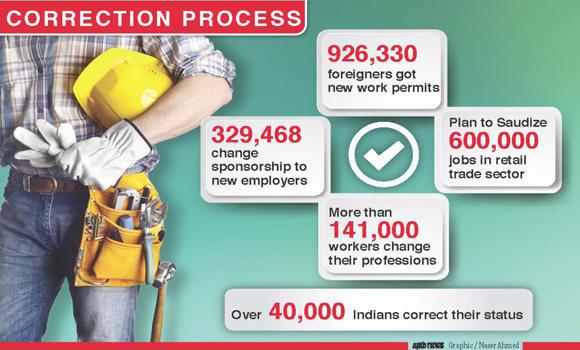1.58 million expats correct status
04:18PM Sun 23 Jun, 2013

 JEDDAH: More than 1.58 million expats in the Kingdom have changed their residence and work status during the amnesty since April, the Labor Ministry said while disclosing plans to Saudize 600,000 jobs in the retail trade sector.
“A total of 1,581,227 have benefited from the correction process during the past eight weeks,” the ministry said, adding 926,330 among them received new work permits.
A total 329,468 workers have transferred their sponsorships to new employers and they represent 21 percent of the total beneficiaries, the ministry said. Twenty-one percent of beneficiaries changed their professions while 59 percent had their work permits renewed.
Deputy Labor Minister Ahmed Al-Humaidan, meanwhile, said jobs in the retail sector, which has an annual turnover of SR 200 billion, would be Saudized gradually, as about 80 percent of its jobs are held by foreigners.
Sibi George, deputy chief of mission at the Indian Embassy in Riyadh, said more than 40,000 Indians have corrected their status.
Speaking to Arab News, he said about 40,000 Indians have got jobs with different companies as a result of efforts made by the Indian Embassy and consulates. Some Indians, who have got emergency certificates to leave the Kingdom, have expressed their desire to make use of the job fairs organized by the embassy and consulates, he added.
In the Riyadh region, 112,200 foreigners or 34 percent of the total beneficiaries transfered their sponsorships, the ministry said. The Makkah region came second with 78,434 or 24 percent changing their sponsorships, followed by Eastern Province (66,627 or 20 percent), Madinah 16,142 or five percent and Qassim 15,836 and Asir 9,355.
About 141,000 workers have changed their professions, with 42,432 or 30 percent of them doing it last week. Twenty-four percent changed their profession to labor, 19 to marketing, 13 to driver and 9 to sales representative.
The largest number of transfers took place to companies specialized in building and construction (51 percent), benefiting 155,038 workers, followed by wholesale and retail trade (22 percent) benefiting 66,598.
Labor Minister Adel Fakeih, said Nitaqat was instrumental in reducing unemployment among the Saudis from 12 percent to 6.1 percent. “Saudis who got jobs after introducing Nitaqat were equal to 38 percent of citizens employed in the past 30 years,” he pointed out.
JEDDAH: More than 1.58 million expats in the Kingdom have changed their residence and work status during the amnesty since April, the Labor Ministry said while disclosing plans to Saudize 600,000 jobs in the retail trade sector.
“A total of 1,581,227 have benefited from the correction process during the past eight weeks,” the ministry said, adding 926,330 among them received new work permits.
A total 329,468 workers have transferred their sponsorships to new employers and they represent 21 percent of the total beneficiaries, the ministry said. Twenty-one percent of beneficiaries changed their professions while 59 percent had their work permits renewed.
Deputy Labor Minister Ahmed Al-Humaidan, meanwhile, said jobs in the retail sector, which has an annual turnover of SR 200 billion, would be Saudized gradually, as about 80 percent of its jobs are held by foreigners.
Sibi George, deputy chief of mission at the Indian Embassy in Riyadh, said more than 40,000 Indians have corrected their status.
Speaking to Arab News, he said about 40,000 Indians have got jobs with different companies as a result of efforts made by the Indian Embassy and consulates. Some Indians, who have got emergency certificates to leave the Kingdom, have expressed their desire to make use of the job fairs organized by the embassy and consulates, he added.
In the Riyadh region, 112,200 foreigners or 34 percent of the total beneficiaries transfered their sponsorships, the ministry said. The Makkah region came second with 78,434 or 24 percent changing their sponsorships, followed by Eastern Province (66,627 or 20 percent), Madinah 16,142 or five percent and Qassim 15,836 and Asir 9,355.
About 141,000 workers have changed their professions, with 42,432 or 30 percent of them doing it last week. Twenty-four percent changed their profession to labor, 19 to marketing, 13 to driver and 9 to sales representative.
The largest number of transfers took place to companies specialized in building and construction (51 percent), benefiting 155,038 workers, followed by wholesale and retail trade (22 percent) benefiting 66,598.
Labor Minister Adel Fakeih, said Nitaqat was instrumental in reducing unemployment among the Saudis from 12 percent to 6.1 percent. “Saudis who got jobs after introducing Nitaqat were equal to 38 percent of citizens employed in the past 30 years,” he pointed out.










